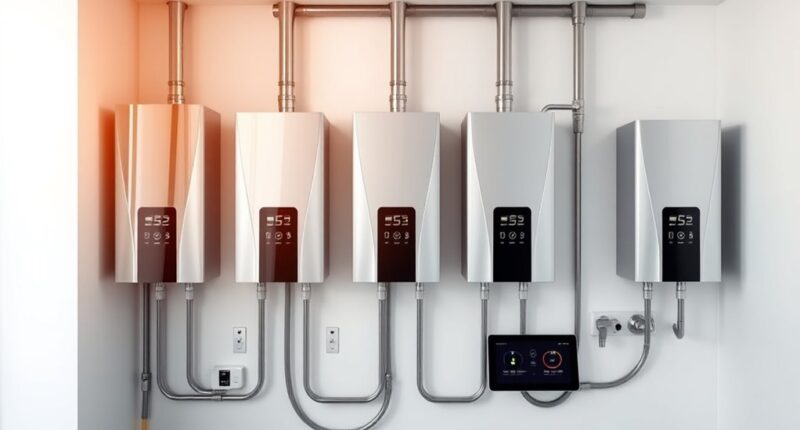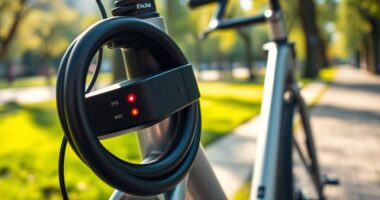If you’re looking for the best smart water heaters of 2025, I suggest considering options like the electric tankless models from WINTEMP and Westinghouse, as well as EcoSmart’s eco-friendly units. These heaters offer remote control, energy efficiency, and safety features, making them a great fit for modern households. To decide which one suits your needs best, keep exploring the key factors and features that matter most for reliable hot water on demand.
Key Takeaways
- Top smart water heaters of 2025 feature WiFi connectivity for easy remote control and monitoring.
- Electric tankless models offer instant hot water with high energy efficiency and safety protections.
- Compatibility with voice assistants like Alexa and Google Assistant enhances user convenience.
- Compact, wall-mounted designs suit small spaces and point-of-use applications.
- Advanced safety features and lifetime warranties ensure reliable, safe operation.
Electric Tankless Water Heater WINTEMP 27kW 240V
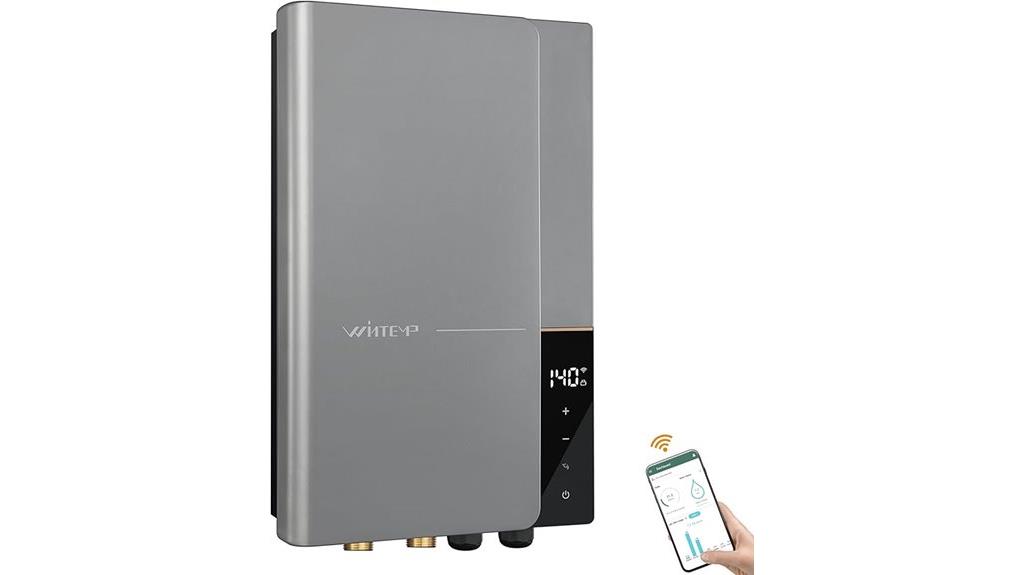
If you’re looking for a reliable, on-demand hot water solution for your entire home, the Electric Tankless Water Heater WINTEMP 27kW 240V is an excellent choice. It delivers endless hot water at up to 6.5 GPM and heats water instantly, with a maximum temperature of 140°F. Its compact, wall-mounted design saves space and features LED controls, WiFi connectivity, and safety protections like overheat and dry-fire prevention. Easy to install with standard household wiring and breakers, it’s perfect for homes with 2–4 usage points. Plus, its energy-efficient technology adjusts power based on demand, helping you save on energy costs.
Best For: homeowners seeking an energy-efficient, space-saving, on-demand hot water solution suitable for homes with 2–4 usage points.
Pros:
- Provides instant, endless hot water with a maximum flow rate of 6.5 GPM
- Compact wall-mounted design saves space and is easy to install
- Features WiFi control and safety protections, including overheat and dry-fire prevention
Cons:
- Requires specific electrical setup with three 40 Amp double-pole breakers and 8/2 AWG wiring
- May be overpowered for smaller households or single-point applications
- Higher initial cost compared to traditional tank heaters, though offset by energy savings
Westinghouse 14kW 240V WiFi Tankless Water Heater

The Westinghouse 14kW 240V WiFi Tankless Water Heater is an excellent choice for small households or spaces where quick, on-demand hot water is essential. Its compact design (14.2″ H x 9.5″ W x 3.5″ D) makes it easy to mount on a wall, saving space. It delivers continuous hot water with a flow rate of 3.38 GPM, supporting a shower plus sink or multiple points of use. The WiFi connectivity lets you control and monitor the unit remotely via an app, while voice commands with Alexa and Google Home add convenience. Built with safety features and corrosion-resistant components, it’s durable and low maintenance.
Best For: small households or spaces that require quick, on-demand hot water with remote control and space-saving installation.
Pros:
- Compact design allows for easy wall mounting and saves space
- WiFi connectivity with app control and voice command compatibility for added convenience
- Safe and durable with multiple protection features and corrosion-resistant components
Cons:
- Supports a maximum flow rate of 3.38 GPM, which may be insufficient for larger households with high simultaneous water demands
- Requires a 60A breaker and proper wiring, which might need professional installation for some users
- Limited to a 12-month warranty, which may be shorter than some competitors
EcoSmart ECO 11 Electric Tankless Water Heater

Designed for small spaces and point-of-use applications, the EcoSmart ECO 11 Electric Tankless Water Heater provides on-demand hot water with precise temperature control. It heats water only when needed, using self-modulating technology to maximize energy efficiency at 99%. Compact and wall-mountable, it measures just 11.5 x 8 x 3.75 inches, making it perfect for bathrooms, sinks, or small offices. Supporting up to 3.1 GPM at 140°F, it offers digital control in 1-degree increments. With a 13,000-watt power draw and a lifetime warranty, this heater combines space-saving design with reliable performance. It’s ideal for climates with incoming water temperatures of 67°F and above.
Best For: small households, point-of-use applications, and spaces with limited installation area needing efficient, on-demand hot water.
Pros:
- Compact, space-saving design measuring only 11.5 x 8 x 3.75 inches
- Offers precise temperature control in 1-degree increments for consistent hot water
- Highly energy-efficient with self-modulating technology and 99% thermal efficiency
Cons:
- Supports a maximum flow rate of 3.1 GPM, which may be insufficient for larger households or simultaneous multiple fixtures
- Best suited for climates with incoming water temperatures of 67°F and above, limiting use in colder regions without low-flow adjustments
- Requires a 220V power supply and a 54A circuit, which may necessitate electrical upgrades for some installations
GoveeLife Smart Kettle with WiFi and Temperature Control
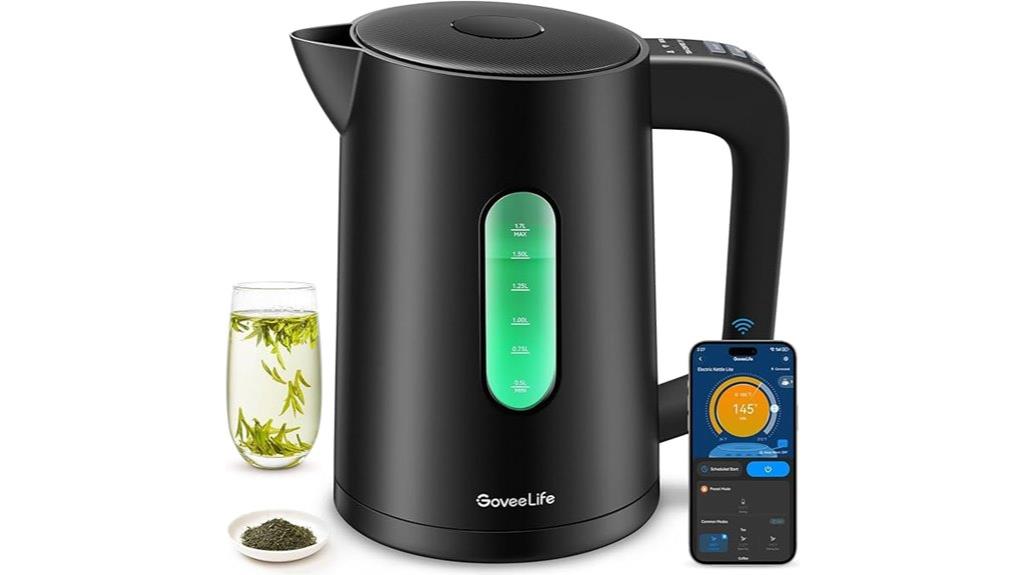
For busy tea or coffee lovers who want precise control over their hot water, the GoveeLife Smart Kettle stands out with its to-the-degree temperature adjustment and WiFi connectivity. You can control it remotely via the app or through voice commands with Alexa and Google Assistant. It features four preset temperature options, DIY mode, and LED indicators for water level and modes. The rapid boiling function heats 7 cups in 5-7 minutes, while the 2-hour keep-warm setting ensures hot water is always ready. Safety is prioritized with automatic shut-off, boil-dry protection, and BPA-free plastic. It’s an efficient, user-friendly choice for hot water on demand.
Best For: busy tea and coffee enthusiasts seeking precise temperature control and remote operation for quick, hot water on demand.
Pros:
- Supports WiFi and Bluetooth for convenient remote control via app or voice commands with Alexa and Google Assistant
- Features to-the-degree temperature adjustment with multiple presets and DIY mode
- Rapid boiling capability and 2-hour keep-warm function for versatile hot water needs
Cons:
- Supports only 120V 60Hz voltage, limiting use in some regions
- Hand washing recommended for maintenance, which may be less convenient than dishwasher-safe options
- Potential for limescale buildup if not properly cleaned, requiring regular maintenance
Ecosmart ECO 24 24 KW Electric Tankless Water Heater
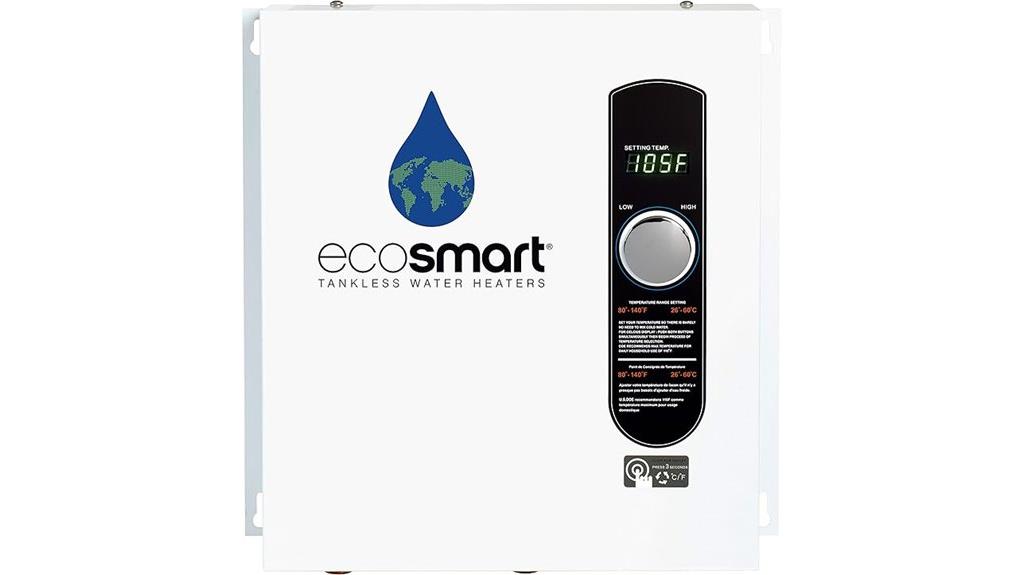
If you’re looking for an efficient and compact water heating solution that delivers precise temperature control, the Ecosmart ECO 24 fits the bill. This 24 KW electric tankless heater has a sleek, wall-mounted design with a digital display and self-modulating technology, allowing temperature adjustments in 1-degree increments. It can produce nearly 3 gallons per minute at low incoming water temperatures, making it suitable for colder climates. With a 99.8% energy efficiency rating and a lifetime warranty on key components, it offers reliable performance. Ideal for demanding residential use, the ECO 24 combines compactness with advanced tech to meet your hot water needs efficiently.
Best For: homeowners seeking an energy-efficient, compact, and precise water heating solution suitable for colder climates and demanding residential use.
Pros:
- Compact wall-mounted design with digital temperature control for precise adjustments in 1-degree increments
- High energy efficiency rating of 99.8%, reducing electricity costs and environmental impact
- Durable components covered by a lifetime warranty, ensuring long-term reliability and peace of mind
Cons:
- Requires specific electrical capacity (240 volts, 24,000 watts), which may necessitate electrical upgrades during installation
- Limited maximum flow rate of 5.8 gallons per minute, potentially insufficient for large households with high simultaneous hot water demand
- Not suitable for outdoor installation or areas with freezing temperatures without additional insulation or protective measures
Factors to Consider When Choosing Smart Water Heaters
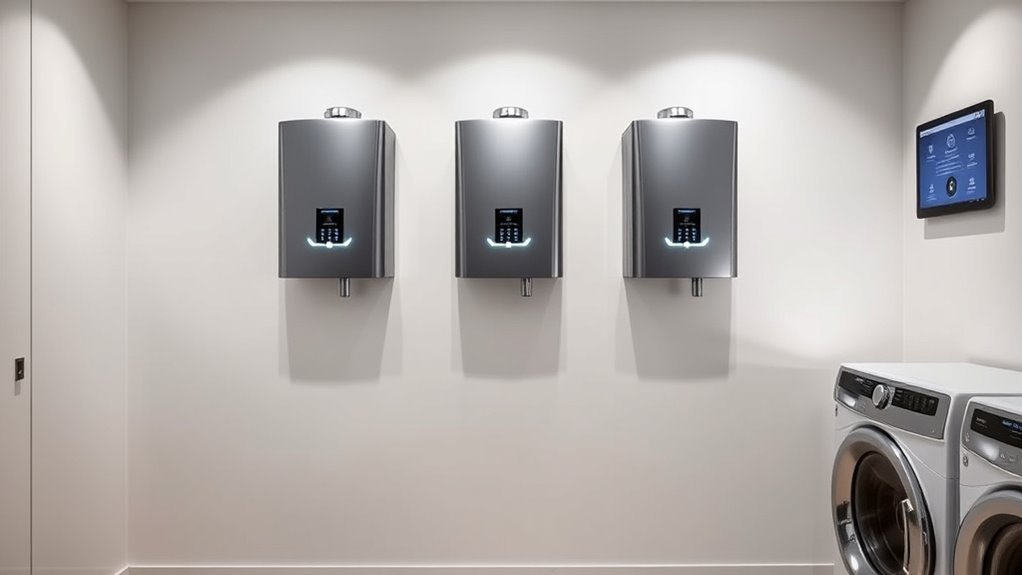
When choosing a smart water heater, I consider factors like water temperature control and energy efficiency to guarantee it meets my needs and saves on bills. I also check for compatibility with my existing systems, installation complexity, and safety features for peace of mind. These points help me select the best model for my home and lifestyle.
Water Temperature Control
Choosing the right smart water heater means paying close attention to its temperature control features. I look for models that allow precise adjustments, often in 1-degree increments, to optimize comfort and save energy. Digital displays or smartphone apps make it easy to monitor and change water temperature remotely, giving me command from anywhere. Automatic regulation is essential for safety and consistency, preventing scalding and maintaining steady water temperature during use. Advanced control systems can adapt to demand, heating only when needed and reducing waste. Some models offer preset modes or customizable settings, so I can tailor the heater to my household’s specific needs. Overall, effective temperature control ensures safety, comfort, and efficiency in my hot water system.
Energy Efficiency Standards
Energy efficiency standards are a vital factor to consider when selecting a smart water heater because they directly impact long-term savings and environmental impact. Certifications like ENERGY STAR ensure the heater meets strict efficiency criteria, helping you get the most hot water with less energy waste. Many models feature self-regulating or modulating technology that adjusts power use based on demand, maximizing efficiency. Some units reach up to 99% efficiency, reducing electrical consumption while maintaining consistent hot water supply. Additionally, adherence to local regulations can influence your choice, potentially qualifying you for rebates or incentives. Proper insulation and advanced control features also play a role in minimizing heat loss and optimizing performance. Prioritizing these standards ensures you select a device that’s both cost-effective and environmentally responsible.
Compatibility Requirements
Ensuring compatibility is essential to getting the most out of a smart water heater, as it must integrate seamlessly with your existing home systems. First, check that the electrical requirements, such as voltage (typically 240V) and breaker size, match your household’s electrical setup to prevent issues. Next, verify that the water connection fittings, like 3/4-inch NPT, fit your plumbing. It’s also important to confirm the device supports your WiFi standards—whether 2.4GHz or 5GHz—for reliable remote control. Additionally, verify the water heater is compatible with your preferred smart home ecosystem, such as Alexa or Google Home, for voice control integration. Lastly, review the maximum flow rate and temperature range to ensure it meets your household’s hot water demands effectively.
Installation Complexity
When evaluating the installation complexity of a smart water heater, it’s important to contemplate how easily it can be integrated into your existing home setup. I check the electrical requirements to confirm my household wiring and breaker capacity can handle the unit, such as a 40A double-pole breaker for some models. I also consider whether I can handle the installation myself or if I’ll need professional help, especially for wall-mounting, electrical wiring, and plumbing connections. Additional components like WiFi modules or voice control setups can add steps to the process. I also verify if any plumbing modifications are needed, such as specific pipe sizes or pressure adjustments. Ultimately, I look at the space available to ensure the unit’s compact design makes installation straightforward in tight areas.
Safety Features Included
Safety features are a crucial factor when choosing a smart water heater because they directly impact the unit’s reliability and your peace of mind. Many models include overheat protection, dry-fire prevention, and leakage detection to guarantee safe operation. These features help prevent damage to the unit and reduce risks like fires or water damage. Most smart water heaters are ETL certified, confirming they meet established safety standards for electrical appliances. Automatic shut-off mechanisms activate during malfunctions or hazardous conditions, adding an extra layer of security. Additional safety components like pressure relief valves and temperature limiters prevent scalding and structural damage. Some models also offer continuous monitoring and alerts for system issues, allowing proactive safety management and peace of mind during everyday use.
Smart Home Integration
Choosing a smart water heater that seamlessly integrates into your home automation system can substantially enhance convenience and energy efficiency. First, make certain it’s compatible with your existing systems like Alexa, Google Home, or Apple HomeKit. WiFi connectivity and app control are essential for remote monitoring and adjustments, so verify these features are included. Look for integration options that allow scheduling, usage tracking, and energy optimization through your smart platform. Voice command support is also valuable for hands-free control and quick status updates. Finally, consider how easy it is to set up—manufacturers should provide clear instructions for smooth integration. A well-integrated system ensures you can control your hot water effortlessly while maximizing efficiency and minimizing energy waste.
Frequently Asked Questions
How Do Smart Water Heaters Integrate With Existing Home Automation Systems?
Smart water heaters connect seamlessly with existing home automation systems through Wi-Fi or Zigbee protocols. I simply download the compatible app, follow setup instructions, and link the heater to my system. This allows me to control temperature, set schedules, and monitor usage remotely. Integration is usually straightforward, making it easy to coordinate with other smart devices for a more efficient and convenient home experience.
What Are the Typical Maintenance Requirements for Smart Water Heaters?
Imagine your smart water heater as a living part of your home, quietly working behind the scenes. Maintenance generally involves checking for mineral buildup, flushing the tank annually, and inspecting connections for leaks. I also recommend updating its software periodically to keep everything running smoothly. Staying on top of these simple tasks guarantees your heater remains efficient, reliable, and ready to deliver hot water whenever you need it.
Can Smart Water Heaters Be Installed Outdoors or in Harsh Environments?
Yes, smart water heaters can be installed outdoors or in harsh environments, but you need to choose models specifically designed for those conditions. Look for units with weatherproofing and corrosion-resistant materials. I recommend consulting the manufacturer’s guidelines to guarantee proper installation and protection. Properly installed, these heaters can withstand outdoor elements, but always prioritize safety and durability to get the best performance and longevity.
How Secure Are the Wifi Connections on These Smart Water Heaters?
I understand security is a concern, but I assure you, the Wi-Fi connections on these smart water heaters are quite secure. They use advanced encryption protocols, similar to those protecting your online banking. Plus, manufacturers constantly update firmware to patch vulnerabilities. So, while no device is entirely invulnerable, these heaters are designed with security in mind, giving you peace of mind while enjoying remote control convenience.
What Is the Average Lifespan of a Smart Water Heater?
A smart water heater usually lasts about 8 to 12 years, depending on usage and maintenance. I’ve found that regular servicing, like flushing out mineral build-up and checking electrical components, can extend its lifespan. Investing in quality models and following the manufacturer’s care instructions also helps. Overall, with proper upkeep, you can enjoy efficient hot water for many years, making it a worthwhile investment.
Conclusion
Choosing the right smart water heater is like finding the perfect thermostat—you want control, efficiency, and peace of mind. I once installed a smart heater during a cold snap, and suddenly, I had hot water waiting exactly when I needed it, saving energy and stress. With these top picks, you can enjoy reliable, remote-controlled hot water that adapts to your lifestyle—making everyday comfort feel effortless and smart.
